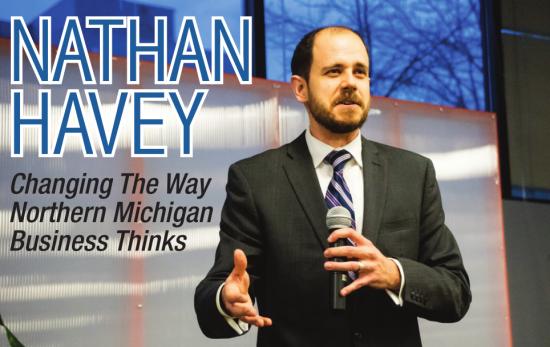Nathan Havey
Changing The Way Northern Michigan Business Thinks
March 25, 2016

Nathan Havey is a myth buster – a business myth buster – and he wants to change the way business takes place across Michigan.
"We are trying to shift the paradigm of business," said Havey, 33, who moved to Leelanau County in August 2014 from Washington, D.C.
Havey is a member of the conscious capitalism movement that is gaining attention across the U.S. and he hopes this concept will help revitalize business in northern Michigan and across the state.
Havey moved to the area with his wife, attorney Cari Simon, but this is not the first cross-country move for him; Havey and his wife have lived in Los Angeles, Boston and even Anchorage, Alaska. They met while both were working on Capitol Hill, he for a congresswoman from his home state of Colorado.
Today, Havey takes on big business goals that he believes, if achieved, have the potential to change communities, states and even the nation.
Havey shares his energy for conscious capitalism with everyone he meets.
"Nathan Havey is amazing. He is full of energy and he believes in conscious capitalism, and it really comes through when he talks about it. He’s very evangelical about it," said Kevin Schlueter, president and chief executive officer of Kalkaska Screw Products, an auto parts manufacturer working with Havey on implanting conscious capitalism principles. Schlueter and Havey met at a Traverse City Area Chamber of Commerce event.
The idea behind conscious capitalism is that business is better in a vibrant economy, which means prosperity and improved quality of life are the ultimate goals of business, Havey said.
"We think the best way to do that is to grow business, and we are right. We just have the wrong measure: profit," he said. "When profit is the only measure, we miss all of the things that are really important. When you do the pillars well, you are going to make more profit than you ever would have, but that’s not the point. This is what is called conscious capitalism."
Havey argues there are several myths that permeate the business world, both socially and financially. Conscious capitalism helps break down those myths via its four pillars: higher purpose, stakeholder orientation, conscious leadership and conscious culture.
Higher purpose is the notion that there is a purpose beyond profit; tremendous benefits can be experienced by employees, customers and the community when a business does well, Havey said.
Conscious capitalism believes every business maintains six stakeholders: employees, customers, suppliers, community, environment and shareholders. A business owner serves as the supreme stakeholder and he/she must abandon trade-off thinking, Havey said, in which decisions are made to benefit one stakeholder group over others.
"When you do that well, you create more value for all of your stakeholders – including your shareholders – than you do when you just prioritize the interests of your shareholders," Havey said.
Conscious leadership is the concept that a business leader’s level of personal development sets a cap for the limitations of the business. This can refer to spiritual, physical or emotional development.
"If you want the business to grow, you have to grow so that your employees grow," Havey said.
Finally, conscious culture is meant to interrupt the business myth that a business must operate by fear and control, discipline and consequences. Instead, conscious capitalism strives to drive fear out of organizations.
"The real thing that creates a great workplace is safety, caring and love," Havey said.
He said he knows some of these ideas can be considered a bit "out there" or even contrary, by many in the business and finance community, but he contends that, if people can change the way they think about the business world, the business world can change their lives for the better.
"Business is the single greatest organizer of effort on the planet," Havey said. "We, as adults, spend half of our adult waking lives in our places of work. If the culture in our place of work is toxic, when you come home, you will bring that with you. The culture of work has tremendous impact on our lives."
Havey also talks about what he calls the "holding back economy." Studies show approximately 70 percent of American workers are disengaged from their jobs.
"For most people, we divorce our work and life, but that’s not really true. You have one life and what you do for work needs to be something about which you are passionate," Havey said.
Havey is president of Thrive Consulting Group, which is working on a project called Thriving Michigan, organized via the Michigan Association of Chamber Professionals. He and his wife are soon expecting their first child.
Trending

The Valleys and Hills of Doon Brae
Whether you’re a single-digit handicap or a duffer who doesn’t know a mashie from a niblick, there’s a n... Read More >>
The Garden Theater’s Green Energy Roof
In 2018, Garden Theater owners Rick and Jennie Schmitt and Blake and Marci Brooks looked into installing solar panels on t... Read More >>
Earth Day Up North
Happy Earth Day! If you want to celebrate our favorite planet, here are a few activities happening around the North. On Ap... Read More >>


